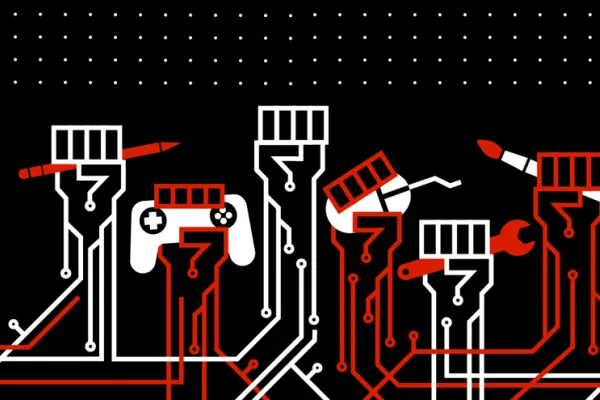End of May Newsletter

Every week more and more tech companies announce they'll move to work from home for the long term. Last week, Facebook CEO Mark Zuckerberg told staff that salaries will be adjusted for those who decide not to return to living in the Bay Area. This means that in the coming months more and more workers will be negotiating salary adjustments (read: decreases) if they decide to move away from Silicon Valley. This will be a stressful time for workers, made even worse by that fact that each worker will be going through negotiations alone, without the benefit of coworkers or a union. The company will have all the information and workers will be forced to figure out if the new offer they receive is similar to what their teammates are being offered.
Unions are helpful at times like these. Unions help represent all the workers as one, giving the collective far more power than any individual against the company. Collective bargaining is one of the reasons why union wages are higher than non-union wages and union workers continue to have access to employer-sponsored benefits. Collective bargaining also leads to more equal pay between men and women and between white workers and workers of color.
As you and your coworkers enter into these conversations about salary and benefits readjustments with management, keep this in mind. Contact an organizer to get involved!
Upcoming Events
TECH LABOR ORGANIZING Part 2: On May 19, fired Google worker Lawrence Berland, Grace Reckers from OPEIU, and an Amazon warehouse worker, Jordan Flowers, spoke on a panel moderated by Raksha, a tech worker and organizer. Watch it here.
CODE-CWA is regularly hosting free, virtual training sessions on how to organize! Registration information can be found here.
Worker News
How Kickstarter Employees Formed A Union: In February 2020 Kickstarter workers became the first white-collar technology workforce to unionize in US history.This is a great story about how workers at Kickstarted came together to form a union. It's dripping with helpful information that may come in handy as you seek to do the same in your workplace.More on Wired.com
An Eighth Amazon Warehouse worker has died from COVID-19: Another Amazon warehouse worker died last week. This comes at a time when Amazon refuses to be transparent about the number of cases across their logistics network. In one particularly hard hit warehouse in northeastern Pennsylvania, more than 100 workers have apparently tested positive for the virus. The exact figure is unknown, as Amazon will not disclose it. More at Tech Crunch
Thomson Reuters is creating target lists for ICE: Reuters built a brand as the "trusted" news agency. However, this news reporting is funded by the over $60 million in contracts their parent company, Thomson Reuters, has with ICE, for whom they largely act as a data broker. News revealed last week reported that Thomson Reuters is going further than acting as a data broker: employees at Thomson Reuters personally fine-tune target lists for who the agency should deport. More at Documented NY
Police in California use Military Surveillance Tech at Grad Student Strike: For months the students at UC Santa Cruz have bravely held strong to demand a cost of living adjustment. Hundreds of grad students organized collectively to withhold grades, and ultimately went on strike. In response police used military surveillance technology to monitor protest activity, and referred to the protests in internal emails as if they were at literal war with the students. They also sought to monitor Senator Bernie Sanders, who tweeted in support of the protests. More at Vice
Gig Companies Spending $110m on a campaign in California to kill workers' rights: Last week, a campaign funded by Uber, Lyft, Doordash, Instacart & Postmates got enough signatures to put a proposition on the California ballot on November 3. The ballot measure seeks at first to exempt the companies from a bill called AB5 that classifies gig workers as employees, and ultimately goes much further: it prevents drivers from getting paid overtime, allows the companies to ignore anti-discrimination laws, denies workers income protection if they get hurt on the job, and prevents workers from accessing paid sick leave. It also comes at a time when Instacart has hired over 100,000 new shoppers, with some getting paid around $5 an hour after expenses. More at Cal Matters
Palantir's Employees Helped ICE pull off the largest raid in NYC: A community in the Bronx was raided by ICE in 2018. Hundreds of families were impacted, agents showed up in the early hours of the morning, forcing their way into homes with guns drawn. One man died falling from a building. Last week, The Appeal revealed that Palantir employees traveled to New York to help ICE agents execute this raid. This comes as FEMA is instructing government agencies to hand over public data to Palantir as part of the tech industries effort to profit from COVID-19, and as the company has seen massive growth as a result of the pandemic. More from The Appeal and The Daily Beast.
Means TV: inside the leftist, worker-owned streaming service: At a time when the media industry is facing devastating layoffs, worker-owned and reader-supported media is starting to see a bit of a revival. Earlier this year Means TV, a Detroit-based worker-owned media streaming service ("Netflix for socialists") launched, and they now have 3,700 subscribers paying $10 a month. Outside the United States, in France, Spain and Argentina, similar models are working. More on TheGuardian.com
Organizer Tip of the Month
"Dear media (tech) workers: Don't listen to your boss. Unionize your workplace."
There's some great advice for workers to push back against the same tired anti-union arguments we hear time and time again in this Talking Points Memo.
Read it and keep these perspectives in mind, because you will come across them when you start to organize at work.
This Month in Labor History
"From a place of despair to a country of struggle"
"A great tension, an awful loneliness, was slowly seeping from Mr. Grossman’s veins. He hadn’t known how miserable he had been. A man couldn’t do anything by himself. He hadn’t known how many people had been going through the same things he had. Something had happened to him. He felt as if he had broken from the prison of his baffled self. No longer did he sit in his home all day. Still there were times on the picket line or while defying police as he helped move someone else’s furniture back in that he wondered at the tight, little in-turned man he once had been. And it hadn’t been much fun. He was growing under the impact of adversity and most of America was growing similarly."
This is a short story about what the Great Depression was like for one family. For years Mr. Grossup had a steady job, a mortgage and a happy home. Months after being laid off, the sheriff was at his door and discarding all his worldly belongings into the street. That was until members of the local Unemployment Council showed up to protect his family and their home.
Read the whole story here on Regeneration Mag.
 San Francisco, CA: Unemployed demonstrate in San Francisco during the Depression carrying picket signs for the Communist party. photograph, 1930’s.
San Francisco, CA: Unemployed demonstrate in San Francisco during the Depression carrying picket signs for the Communist party. photograph, 1930’s.
Song of the Week
Dolly Parton 9-5
Workin' 9 to 5, what a way to make a livin'
Barely gettin' by, it's all takin' and no givin'
They just use your mind and they never give you credit
It's enough to drive you crazy if you let it
9 to 5, for service and devotion
You would think that I would deserve a fat promotion
Want to move ahead but the boss won't seem to let me
I swear sometimes that man is out to get me!
CODE-CWA Newsletter: February 21, 2025

